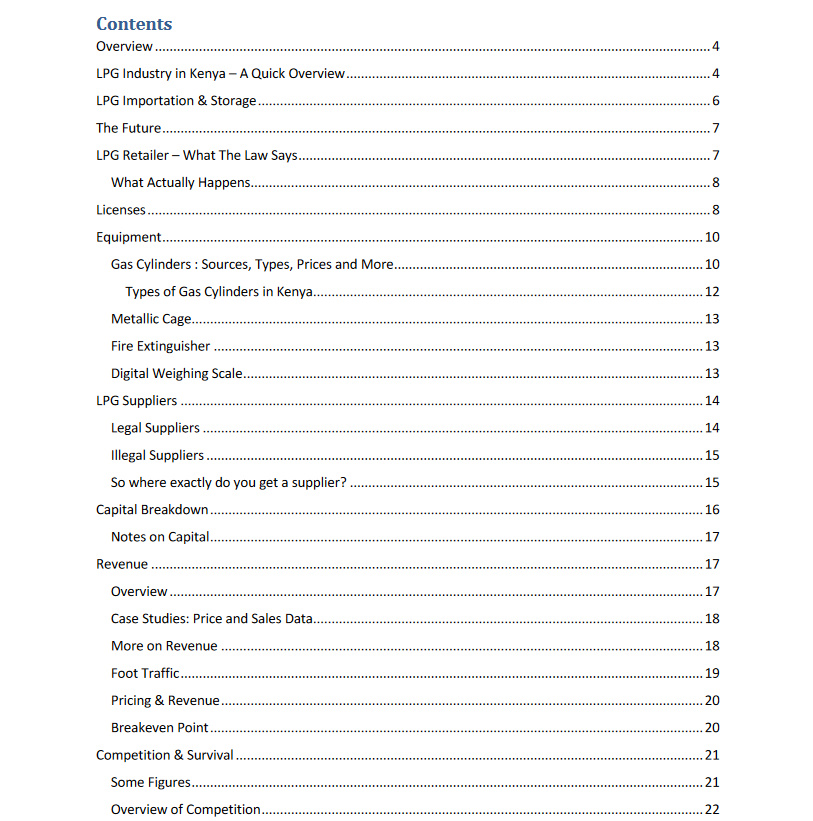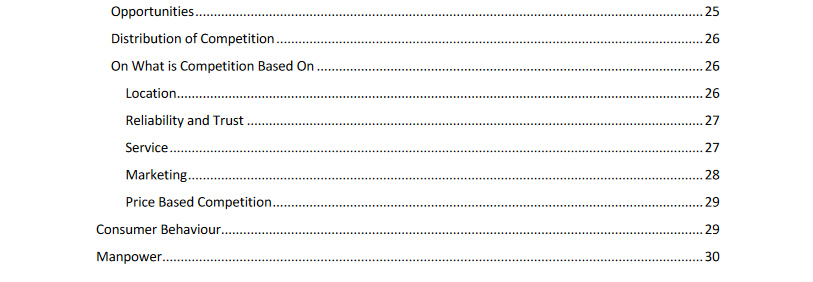Gas(LPG) Retail Business Plan
Gas(LPG) Retail Business Plan


Gas(LPG) Retail Business Plan Overview
This Gas(LPG) Retail Business Plan focuses on the informal retail of Liquefied Petroleum Gas (LPG) commonly known as Gas. “ Informal “ is in the sense these are comparatively small businesses operating in a relatively relaxed manner as compared to the ‘formal’ like branded petrol stations and their more established agents like supermarkets.
The Gas(LPG) Retail Business involves consumers exchanging their empty gas cylinders with a full refilled cylinder at a fee. The retailer takes the empty cylinder to a wholesaler who refills it at an agreed price then sells to the next customer.
Gas retail as of the nature common in estates and smaller towns, where the dealers are independent selling the brands of different oil companies, operates on a legal grey area. Legalities touching on licensing, wholesale sources, equipment, location and setting. The fact that many are able to acquire county government business permit licenses, survive and thrive does not sanitize the illegal aspects of the business, and if the law was to be strictly implemented many of them would be forced to close or realign their businesses.
In no way does this mean that the business is not viable or that there are no retailers operating within the law. Not at all. As you will see in this survey consumption of gas is growing, and opportunities abound in some locations.
Before we get to the actual figures on Capital, Revenue & Margins, Competition & Survival, Consumer Behavior, Tips, Tricks and more a little background of the LPG business in Kenya will be of help in understanding the industry, legal loopholes, possible opportunities and trends.
LPG Industry in Kenya
Trade in LPG is to a very large extent guided by the Energy Act 2009 and regulated by the Energy Regulatory Commission. Others who have a say in different licensing aspects of the business include county governments and state organizations like Energy Regulatory Commission and National Environment Management Authority (NEMA).
Prior to 2009 gas cylinders were locked to particular oil companies that marketed them. This was through company specific cylinder valves. For instance a Totalgaz cylinder valve from Total Kenya could only fit a Totalgaz cylinder and so forth.
As a consumer it was not possible to interchange a Total Cylinder with a K–Gas. This meant that if your Totalgaz run out, you had to look for a Total Petrol Station for a refill. If there was a Kenol Kobil Petrol station located a hundred meters from your house and the Total station 2 kilometers away, then you had no option but to transport your cylinder to the latter in exchange for another.
In 2009 the government through legislation decided that gas cylinder valves were to be standardized. Out went the company specific valves and in came the universal valve which could fit any gas cylinder irrespective of the brand. The standardization was partially in response to pressure from small independent oil marketers who felt without such a move there was no way they could compete in a market dominated by big well funded multinationals.
Majority of the consumers are not aware of cross filling and other workings of the LPG industry. All they want is gas, and conveniently so.
The Future
Big oil companies have started pushing for the reintroduction of company specific valves, quoting safety concerns, revenue leakages and tax evasion by the illegal wholesalers. The government has not shown any indication of reversing the 2009 legislation. Perhaps before a blanket reversal there will be more efforts to have the ERC and other regulatory bodies like NEMA and the police reign in on cross refilling and illegal refilling.
Meanwhile some companies have started experimenting with RFIDs to trace the movement of their cylinders; from their depots to the consumer and back. It’s still early to determine the success of such efforts. Other companies are using universal but self sealing valves, meaning the cylinder protects itself from refilling by other wholesalers. It will take quite some time for these measures to have any impact since many cylinders are circulating within the informal channels.
Despite all the hiccups about 95% of the oil companies who are members of the cylinder exchange pool consider the LPG business profitable. The profits and relatively high in the business will continue to attract illegalities.
Download Gas(LPG) Retail Business Plan / guide here